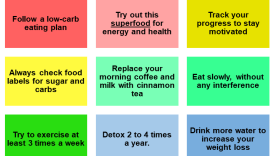The Science Behind a Successful Healthy Living Challenge

Introduction to Healthy Living Challenges
Benefits of Participating
Engaging in healthy living challenges can significantly transform one’s lifestyle. Those who have participated often report numerous benefits, such as:
- The Science Behind a Successful Healthy Living Challenge
- Introduction to Healthy Living Challenges
- Benefits of Participating
- Importance of Scientific Approach
- Setting Realistic Health Goals
- Understanding SMART Goals
- Tracking Progress Using Metrics
- Nutrition and Meal Planning
- Impact of Balanced Diet
- Strategies for Meal Prepping
- Physical Activity and Exercise
- Exercise Guidelines for Health
- Incorporating Physical Activity into Daily Routine
- Mental Well-being and Stress Management
- Connection Between Mind and Body
- Techniques for Stress Relief
- Sleep and Recovery
- Importance of Quality Sleep
- Creating a Relaxing Bedtime Routine
- Building a Support System
- Benefits of Accountability Partners
- Seeking Professional Guidance
- Overcoming Challenges and Setbacks
- Identifying Common Obstacles
- Strategies for Resilience
- Monitoring Health Progress
- Utilizing Health Tracking Tools
- Celebrating Milestones
- Long-term Maintenance of Healthy Habits
- Forming Sustainable Routines
- Adjusting Goals for Continued Success
- Enhanced Motivation: Exercising alongside others fosters a sense of community and accountability.
- Improved Health: Participants generally notice a decrease in unhealthy habits and an increase in physical activity levels.
- Skill Development: Learning new recipes, workouts, or mindfulness techniques can enhance participants’ knowledge and skills.
For instance, Maria, who joined a fitness challenge last year, discovered that meal prepping not only saved her time but also encouraged healthier eating habits. By participating, she transformed her approach to nutrition and gained newfound confidence.
Importance of Scientific Approach
Taking a scientific approach to healthy living enhances the effectiveness of any challenge. Utilizing established research-based methodologies ensures that participants are:
- Well-Informed: Understanding the ‘why’ behind dietary choices and exercise routines leads to informed decisions.
- Health-Focused: Evidence-based practices reduce the risk of injury and promote overall well-being.
- Measurable: Applying scientific metrics allows for tracking progress effectively.
Incorporating a scientific perspective empowers individuals, making the journey toward health not just a challenge, but a rewarding learning experience that can last a lifetime.
Setting Realistic Health Goals
Understanding SMART Goals
Transitioning from challenges to achievement starts with setting realistic health goals. One effective framework for this is the SMART criteria, which encourages individuals to create goals that are:
- Specific: Rather than saying “I want to get fit,” a specific goal would be “I will walk 30 minutes every day.”
- Measurable: This means you can track your progress. For example, aim to lose five pounds in a month.
- Achievable: Ensure your goals are within reach. Setting a goal to run a marathon next month may not be realistic for a beginner.
- Relevant: The goal should matter to you. For instance, if you seek better mental health, practicing yoga may resonate more than lifting weights.
- Time-bound: Set a deadline to create urgency, like “I will complete this goal by the end of the month.”
Tracking Progress Using Metrics
Once goals are established, tracking progress is essential to stay motivated. Utilizing specific metrics can make a significant difference. Consider these methods:
- Journals: Logging your meals and workouts provides insight into your daily habits.
- Apps: Many fitness or health apps offer tracking capabilities for food intake, exercise, and even mood.
- Weekly Check-ins: Setting aside time each week to review your progress allows for adjustments and encourages reflection.
John, for example, started using a fitness app to track his daily walks and noticed improvements in both his mood and energy levels. By analyzing his weekly data, he set a new, higher goal that further motivated him. Embrace the journey of setting and tracking your health goals for a more empowered experience!
Nutrition and Meal Planning
Impact of Balanced Diet
Building on the foundations of goal-setting and progress tracking, a balanced diet plays a crucial role in achieving health objectives. When individuals prioritize nutrition, they experience numerous benefits, including:
- Improved Energy Levels: A diet rich in whole foods fuels the body for daily activities and workouts.
- Better Mental Health: Studies suggest that nutrients like omega-3 fatty acids and antioxidants can positively impact mood and cognitive function.
- Weight Management: Quality nutrition helps regulate appetite and maintain a healthy weight.
For instance, Lisa switched to a balanced diet, incorporating fruits, vegetables, lean proteins, and whole grains. She noticed increased stamina during her workouts and felt more focused during the day.
Strategies for Meal Prepping
To further support a balanced diet, meal prepping can be a game-changer. Here are some effective strategies to consider:
- Plan Weekly Menus: Designate a specific day to plan meals for the week, ensuring variety and balance.
- Batch Cooking: Prepare larger portions of staple recipes, such as soups or grains, to save time.
- Utilize Storage Containers: Invest in clear containers to portion out meals; this encourages proper serving sizes and keeps meals organized.
By employing these strategies, individuals can simplify healthy eating and reduce the temptation of junk food during hectic weeks. Alex, for instance, dedicated Sundays to meal prep, which transformed his approach to nutrition and entirely simplified his weekdays. Healthy living is all about making smart, sustainable choices—and meal preparation is a fantastic step in that journey!
Physical Activity and Exercise
Exercise Guidelines for Health
With a solid foundation in nutrition, it’s vital to incorporate physical activity to maintain overall health. The World Health Organization recommends adults engage in at least:
- 150 minutes of moderate-intensity exercise per week, such as brisk walking or cycling.
- Or 75 minutes of vigorous-intensity activity, like running or aerobics.
These guidelines also suggest including muscle-strengthening activities twice a week for all major muscle groups. For example, Sarah, who used to dread exercise, began with short 10-minute walks and gradually increased her activity level as her fitness improved.
Incorporating Physical Activity into Daily Routine
Life is busy, but staying active doesn’t have to be complicated. Here are some straightforward ways to weave more movement into your day:
- Take the Stairs: Avoid elevators whenever possible.
- Active Commuting: Consider walking or cycling to work instead of driving.
- Short Exercise Breaks: Schedule 5-minute movement breaks during long work hours, which could be as simple as stretching or taking a brisk walk.
Tom, a desk worker, started doing quick stretching routines during his breaks and felt refreshed and more productive afterward. By finding opportunities for movement throughout the day, anyone can enhance their fitness journey and improve overall well-being!
Mental Well-being and Stress Management
Connection Between Mind and Body
As individuals embrace physical activity, it’s essential to recognize the significant link between mental well-being and physical health. Research shows that a healthy lifestyle can lead to:
- Reduced Stress Levels: Regular exercise releases endorphins, often referred to as ‘feel-good’ hormones, which can lead to improved mood.
- Enhanced Cognitive Function: Physical activity boosts brain health, leading to sharper concentration and enhanced clarity of thought.
- Better Stress Management: A balanced diet and regular exercise help in managing cortisol, the body’s primary stress hormone.
For instance, after incorporating yoga and mindful breathing into her routine, Emma found herself not only stronger physically but more resilient emotionally, handling daily stressors with greater ease.
Techniques for Stress Relief
To effectively manage stress, incorporating various techniques into daily life can be beneficial. Here are some effective methods:
- Mindfulness Meditation: Spend a few minutes each day focusing on your breath and clearing your mind.
- Deep Breathing Exercises: Practice inhaling deeply through your nose and exhaling through your mouth to quickly alleviate anxiety.
- Engagement in Hobbies: Dedicate time to activities that bring joy, whether it’s painting, gardening, or reading.
Mike started painting again after a long hiatus, and he found it to be a therapeutic way to decompress after stressful workdays. By emphasizing mental well-being alongside physical health, individuals can create a well-rounded approach to overall wellness, ensuring they thrive in both mind and body!
Sleep and Recovery
Importance of Quality Sleep
Following a journey that emphasizes both mental well-being and physical activity, it’s crucial to address quality sleep, a cornerstone of recovery. Quality sleep plays a vital role in overall health by:
- Restoring Energy: During sleep, the body repairs muscles and strengthens the immune system.
- Improving Mood: A good night’s sleep enhances emotional regulation, leading to better stress management.
- Boosting Cognitive Function: Adequate sleep sharpens focus, memory, and decision-making skills.
Take Mark, who realized that his late-night binge-watching habit was affecting his fitness goals. Once he prioritized sleep, he noticed a remarkable improvement in his energy levels and workout performance.
Creating a Relaxing Bedtime Routine
Establishing a calming bedtime routine can significantly enhance sleep quality. Consider these effective practices:
- Consistent Sleep Schedule: Go to bed and wake up at the same time each day, even on weekends.
- Limit Screen Time: Turn off electronic devices an hour before bed to reduce blue light exposure.
- Engage in Relaxation Techniques: Incorporate activities like reading, gentle stretching, or listening to calming music.
After implementing these changes, Laura found that her quality of sleep improved dramatically. By prioritizing restful sleep and creating a conducive bedtime routine, individuals can enhance their recovery, ensuring they are recharged and ready to tackle their health journeys each day!
Building a Support System
Benefits of Accountability Partners
As one continues their journey towards improved health, establishing a strong support system can make all the difference. One of the most impactful elements of this system is having accountability partners. These individuals can provide:
- Motivation: Sharing goals encourages mutual support, pushing each other to stay committed.
- Emotional Support: Having someone to celebrate wins or discuss challenges with enhances the overall experience.
- Increased Consistency: Regular check-ins can help maintain routine, making it easier to stick to health goals.
For instance, when Jenna paired up with a friend for their fitness journey, they ensured each other attended workouts and shared healthy recipes. The result? A newfound dedication to their goals!
Seeking Professional Guidance
In addition to accountability partners, seeking professional guidance can significantly expedite progress. Professionals such as nutritionists, personal trainers, or mental health counselors can provide:
- Personalized Plans: Tailored approaches to diet and exercise ensure that individual needs are addressed.
- Expert Knowledge: Professionals can offer insights based on scientific research that may be overlooked otherwise.
- Support during Challenges: They can equip individuals with strategies to overcome obstacles in their health journey.
When Rachel consulted a dietitian to navigate her dietary needs, she discovered a wealth of information that transformed her relationship with food. Building a robust support system through both personal connections and professional resources can effectively enhance one’s health journey, making it less intimidating and much more enjoyable!
Overcoming Challenges and Setbacks
Identifying Common Obstacles
With a solid support system in place, it becomes essential to recognize that challenges and setbacks are a natural part of any health journey. Common obstacles many face include:
- Time Constraints: Juggling work, family, and health can lead to prioritizing everything but self-care.
- Motivational Dips: It’s normal to experience fluctuations in motivation, especially when results aren’t visible immediately.
- Plateaus: Many individuals encounter a plateau in weight loss or fitness that can feel discouraging.
For instance, when Sam hit a plateau after weeks of hard work, he initially struggled, feeling lost and unmotivated.
Strategies for Resilience
Overcoming these challenges requires resilience and practical strategies. Here are a few effective approaches:
- Set Small Milestones: Break down goals into smaller, achievable targets to maintain motivation.
- Reevaluate and Adapt: Periodically assess your routine and be flexible in modifying your approach if something isn’t working.
- Practice Self-Compassion: Remind yourself that setbacks are part of progress. Allowing for mistakes can foster a healthier mindset.
When Sam learned to adjust his goals and celebrate small wins, he regained his momentum. Developing resilience is crucial in navigating health challenges. With the right mindset and strategies, anyone can overcome obstacles and continue thriving in their health journey!
Monitoring Health Progress
Utilizing Health Tracking Tools
In the pursuit of health, monitoring progress is essential, especially after overcoming challenges. Utilizing health tracking tools can help individuals stay informed and motivated. Some popular options include:
- Fitness Apps: Apps like MyFitnessPal or Fitbit allow users to log workouts, food intake, and water consumption, providing visual progress reports.
- Wearable Devices: Fitness trackers can offer real-time data on steps taken, heart rate, and sleep patterns, making it easier to stay accountable.
- Health Journals: Keeping a handwritten log can be a personal and reflective way to assess energy levels, mood, and dietary choices.
For example, when Mark started using a fitness app, he was surprised to see how much he moved each day, which encouraged him to set higher activity goals.
Celebrating Milestones
As individuals track their progress, celebrating milestones becomes crucial in maintaining motivation. Recognizing achievements—big and small—reinforces commitment. Consider these ideas:
- Reward Yourself: Treat yourself to a massage, new workout gear, or a day off to enjoy activities you love.
- Share Success: Celebrate with friends or family who supported you; perhaps organize a small gathering to acknowledge your journey.
- Reflect and Celebrate: Take time to reflect on how far you’ve come. Writing a note to yourself celebrating your achievements can be powerful.
When Anna completed her first 5K run, she treated herself to a spa day, which motivated her to continue setting new fitness goals. Incorporating both monitoring and celebration into your health journey not only fosters progress but also creates a positive and enjoyable experience!
Long-term Maintenance of Healthy Habits
Forming Sustainable Routines
After celebrating progress and achieving numerous milestones, the final step in a healthy journey is to focus on long-term maintenance. Forming sustainable routines is crucial for lasting success. Here are a few strategies:
- Start Small: Implement minor changes gradually, like incorporating an additional serving of vegetables into meals or adding a 10-minute evening walk.
- Create Consistency: Designate specific times for physical activity and meal prep, turning these into habitual events.
- Stay Flexible: Life can be unpredictable; allow yourself the freedom to adapt your routine as needed without self-judgment.
For example, Laura adjusted her morning gym time to fit her current work schedule, ensuring that fitness remained a priority.
Adjusting Goals for Continued Success
As individuals progress, it’s essential to revisit and adjust health goals regularly. Here’s how to do it effectively:
- Evaluate Progress: Regularly assess what’s working and what needs adjustment. If you’ve achieved your original goals, set new ones that challenge and excite you.
- Maintain Motivation: Keep things fresh by trying new workouts, recipes, or activities that align with your interests.
- Incorporate Feedback: Use insights from tracking tools to inform your new objectives to avoid hitting plateaus.
When Tom transitioned from basic fitness goals to more challenging activities like hiking, he found renewed motivation. Maintaining healthy habits is an ongoing journey filled with opportunity for personal growth and enjoyment. By forming sustainable routines and adjusting goals, individuals can ensure lasting success in their health endeavors!





